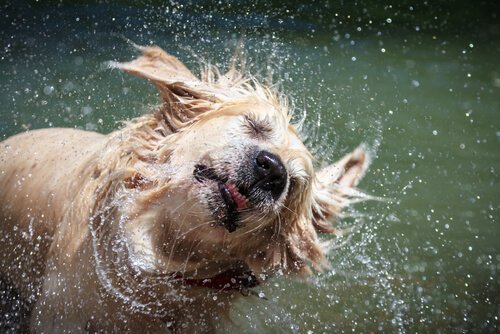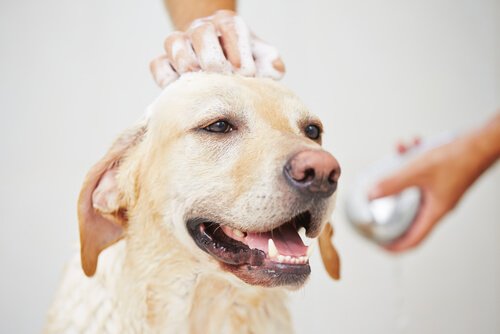Tips for Preventing Wet Dog Smell


Written and verified by the lawyer Francisco María García
When wet, all of the germs mobilize; this causes an unpleasant and strong smell. This happens both in dogs as well as the surfaces that they come into contact with, such as carpets, furniture, and the animal’s own space.

Tips for eliminating wet dog smell
You cannot avoid this smell unless the dog has been washed recently. Although, it is possible to get rid of it once it has appeared. Below, we are going to give you some suggestions:
- Dog shampoo. When your pet is wet, you should take advantage of this opportunity to wash him with specially designed dog shampoo.
- Drying. You need to dry your dog’s fur very well. To do that, a vigorous towel-drying is not enough. An electric blow dryer is a good option, but some dogs are terrified of it. In that case, you need to do it very gradually and at a low temperature, so that the animal gets used to it.
- You should brush him at the same time so that the germs that produce the bad smell are mobilized. This is especially recommended for animals with long hair.
- Periodic baths. Dogs should not be washed frequently, since it eliminates their layer of fat; this makes them prone to dryness, itchiness, and irritation. It also makes them vulnerable to cutaneous diseases. The veterinarian can recommend the frequency according to the type of animal.
- Brushing routine. Periodic brushing is especially good for long-haired dogs. This distributes the fat, eliminates dead skin cells and foreign substances, and gives them a beautiful glow.
Effective homemade remedies for wet dog smell
- White vinegar. A homemade solution is spraying the pet’s fur with a mix of water and white vinegar. The latter should be a low dose so as not to irritate his skin and so he doesn’t keep smelling the substance.
- Sodium bicarbonate. This is another recommended homemade trick. Sprinkle bicarbonate on the fur while simultaneously brushing him. The bicarbonate is a natural deodorant that is very effective and that doesn’t have any contraindications.
- Commercial deodorants. There are deodorants in the market specially designed for preventing or getting rid of wet dog smell. Since they do have chemical formulas, you should have a look at their components and not over-use them so as to not hurt the animal’s skin.
- Exposure to the sun. A dog that constantly lives inside needs to be exposed to the sun as much as possible; at least once a day depending on the season. A moderate exposure can reduce wet dog smell.
- Cleaning the spaces and surfaces in contact with the animal. The spaces and surfaces that are in contact with the animal should be thoroughly washed. Otherwise, the dog will smell bad again. Once they are clean, using the vacuum cleaner and the natural deodorants like vinegar and sodium bicarbonate can guarantee deodorization even more.

What to do if the smell persists
If the problem persists in spite of all these suggested solutions, the dog could be suffering from some skin disease. Especially if he has symptoms such as itching, peeling, or a change in coloring and appearance in certain areas.
If he shows these signs, it is necessary to consult the veterinarian because he could be suffering from atopy or atopic dermatitis, the most common dermatological condition in dogs.
This condition, atopy, is due to a certain genetic predisposition. It causes allergies to agents such as mites and their droppings, insects, fungi, and pollen. It can also be aggravated by food allergies, and make the dog more vulnerable to bacteria that produce a bad smell.
Preventing wet dog smell or getting rid of it once it’s already there is possible to some extent, depending on what is causing it. All of this for a good coexistence.
When wet, all of the germs mobilize; this causes an unpleasant and strong smell. This happens both in dogs as well as the surfaces that they come into contact with, such as carpets, furniture, and the animal’s own space.

Tips for eliminating wet dog smell
You cannot avoid this smell unless the dog has been washed recently. Although, it is possible to get rid of it once it has appeared. Below, we are going to give you some suggestions:
- Dog shampoo. When your pet is wet, you should take advantage of this opportunity to wash him with specially designed dog shampoo.
- Drying. You need to dry your dog’s fur very well. To do that, a vigorous towel-drying is not enough. An electric blow dryer is a good option, but some dogs are terrified of it. In that case, you need to do it very gradually and at a low temperature, so that the animal gets used to it.
- You should brush him at the same time so that the germs that produce the bad smell are mobilized. This is especially recommended for animals with long hair.
- Periodic baths. Dogs should not be washed frequently, since it eliminates their layer of fat; this makes them prone to dryness, itchiness, and irritation. It also makes them vulnerable to cutaneous diseases. The veterinarian can recommend the frequency according to the type of animal.
- Brushing routine. Periodic brushing is especially good for long-haired dogs. This distributes the fat, eliminates dead skin cells and foreign substances, and gives them a beautiful glow.
Effective homemade remedies for wet dog smell
- White vinegar. A homemade solution is spraying the pet’s fur with a mix of water and white vinegar. The latter should be a low dose so as not to irritate his skin and so he doesn’t keep smelling the substance.
- Sodium bicarbonate. This is another recommended homemade trick. Sprinkle bicarbonate on the fur while simultaneously brushing him. The bicarbonate is a natural deodorant that is very effective and that doesn’t have any contraindications.
- Commercial deodorants. There are deodorants in the market specially designed for preventing or getting rid of wet dog smell. Since they do have chemical formulas, you should have a look at their components and not over-use them so as to not hurt the animal’s skin.
- Exposure to the sun. A dog that constantly lives inside needs to be exposed to the sun as much as possible; at least once a day depending on the season. A moderate exposure can reduce wet dog smell.
- Cleaning the spaces and surfaces in contact with the animal. The spaces and surfaces that are in contact with the animal should be thoroughly washed. Otherwise, the dog will smell bad again. Once they are clean, using the vacuum cleaner and the natural deodorants like vinegar and sodium bicarbonate can guarantee deodorization even more.

What to do if the smell persists
If the problem persists in spite of all these suggested solutions, the dog could be suffering from some skin disease. Especially if he has symptoms such as itching, peeling, or a change in coloring and appearance in certain areas.
If he shows these signs, it is necessary to consult the veterinarian because he could be suffering from atopy or atopic dermatitis, the most common dermatological condition in dogs.
This condition, atopy, is due to a certain genetic predisposition. It causes allergies to agents such as mites and their droppings, insects, fungi, and pollen. It can also be aggravated by food allergies, and make the dog more vulnerable to bacteria that produce a bad smell.
Preventing wet dog smell or getting rid of it once it’s already there is possible to some extent, depending on what is causing it. All of this for a good coexistence.
This text is provided for informational purposes only and does not replace consultation with a professional. If in doubt, consult your specialist.








